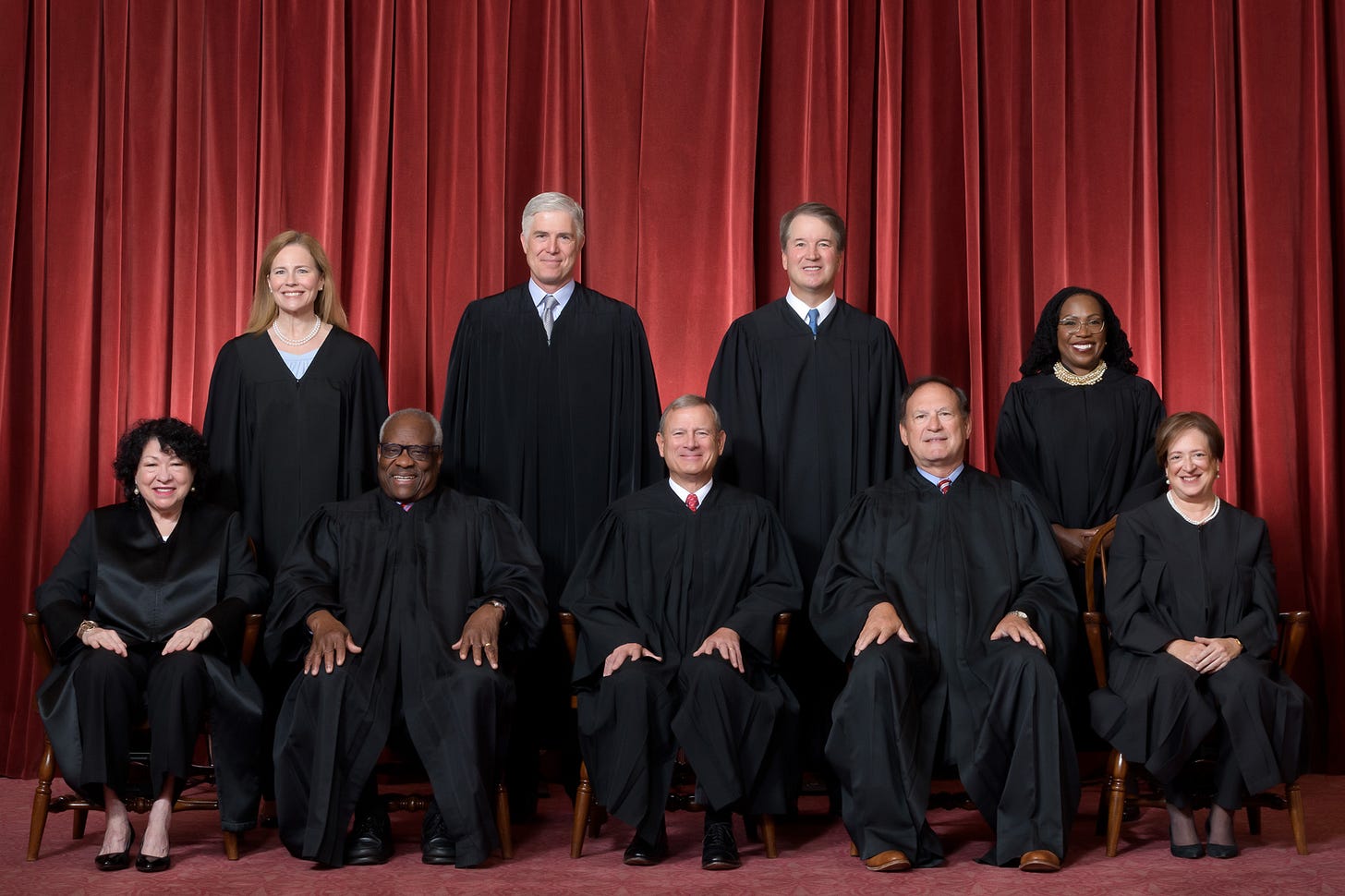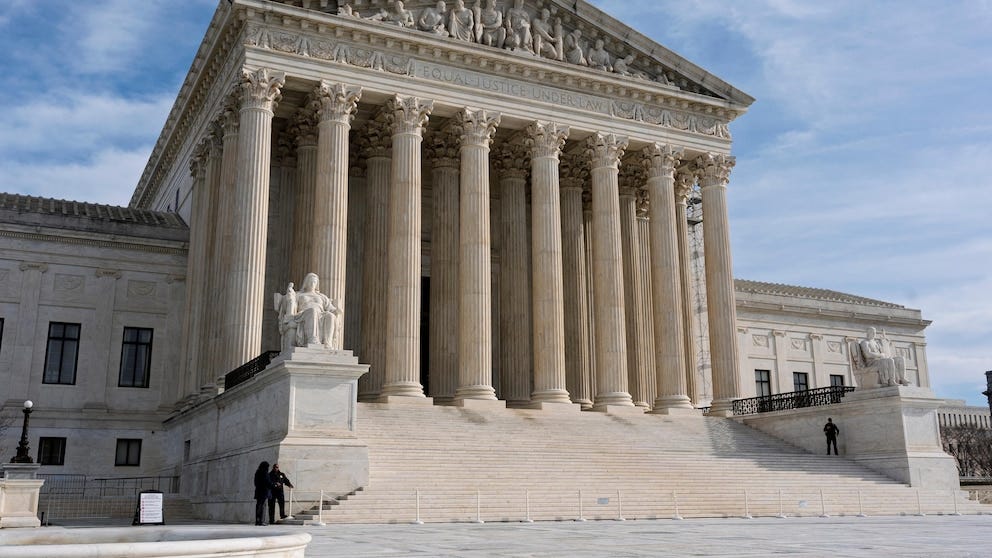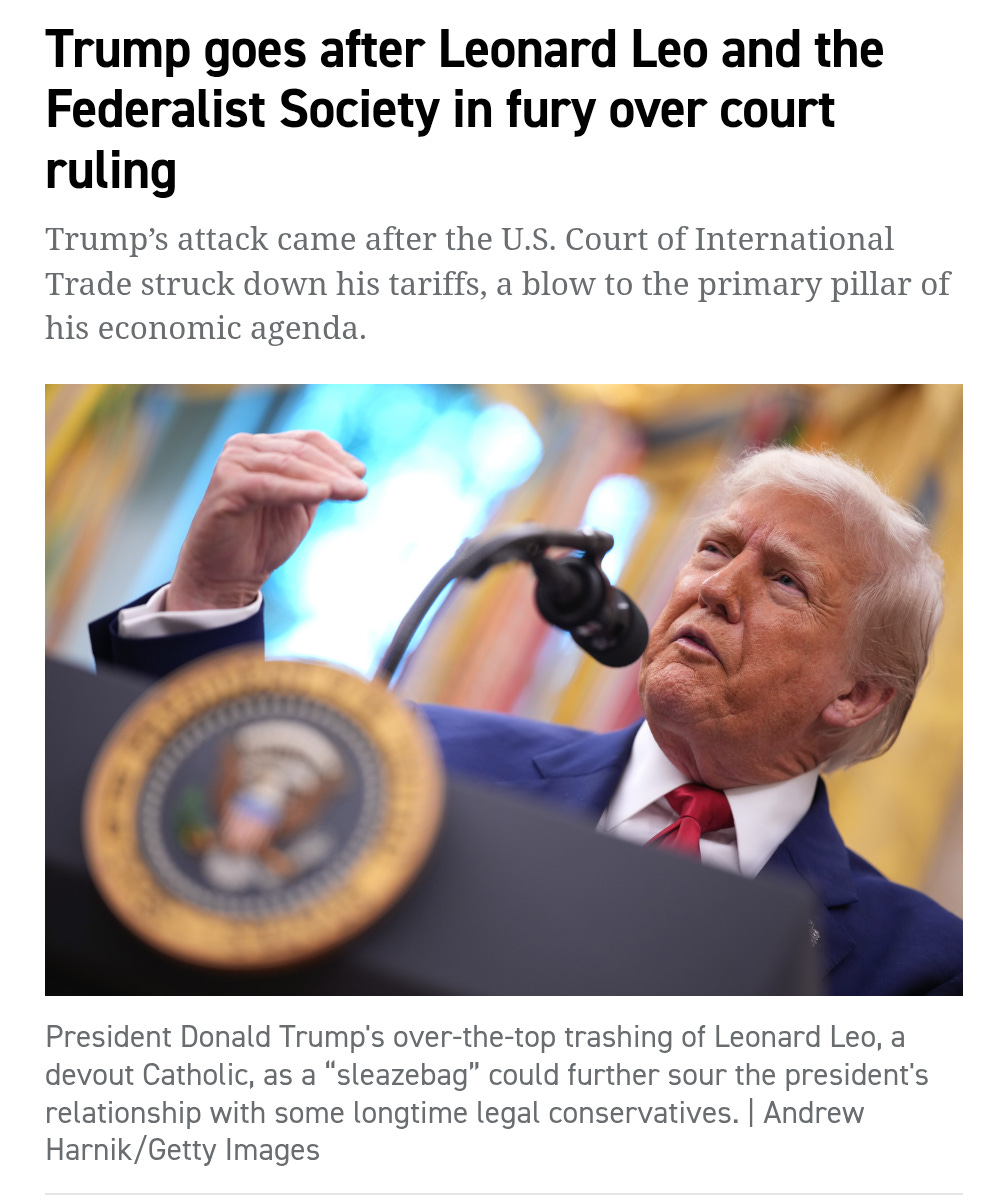With a nod to Kautilya, the 4th Century BCE Hindu scholar who is believed to be the first person to exclaim, "the enemy of my enemy is my friend," I was quite pleased to read this morning that the conservative Federalist Society has joined a host of moderates and progressives in opposing President Donald Trump's trite and trifling Tariff Trade War.
If you're not all that familiar with the Federalist Society, do know that it bills itself as an "American conservative and libertarian legal organization that advocates for a textualist and originalist interpretation of the U.S. Constitution."
While the above description sounds all legalese and whatnot, allow me to plainly state that for several decades, the Federalist Society has been the main catalyst behind the appointment of conservative judges on the federal and state levels, including current Supreme Court Chief Justice John Roberts; Justices Clarence Thomas, Samuel Alito, Neil Gorsuch, Brett Kavanaugh, and Amy Coney Barrett.
Six of the current nine U.S. Supreme Court Justices received the blessings of the Federalist Society during their confirmation processes…
To break it down even further, pick a conservative Supreme Court decision from the last two decades, whether it's repealing abortion rights, rolling back civil rights, or expanding police powers and Executive Branch authority, and know that the Federalist Society was somewhere in the mix writing amicus (friend of the court) briefs and infusing conservative dogma through its seminars for lawyers and future judges who share its ideological ideals.
The Supreme Court
As to the appointment of judges, long ago, the Federalists borrowed a page from the American Bar Association in vetting potential judges and whenever the Oval Office is occupied by a Republican, its influence has far exceeded the ABA's in the selection and confirmation of judicial candidates.
Such is why last week's schism with the Trump administration on tariffs was huge; when the U.S. Court of International Trade held that he lacked the authority to unilaterally tax via tariffs, their decision was clearly influenced by a Federalist Society brief filed in April that to date, constitutes the strongest conservative push back against the president's previously unchecked power grab—one which has repeatedly crossed the constitutional line that separates the Executive and Legislative Branches of Government.
Trump's “See Spot Run” Rose Garden lecture on unilateral tariffs from April 2025
A few highlights from the Federalist Society's brief, which was written by Michael W. McConnell, a former federal appeals court judge appointed by President George W. Bush who now teaches at Stanford Law School, and Joshua A. Claybourn, a noted conservative lawyer and historian, include:
"The powers to tax, to regulate commerce and to shape the nation’s economic course must remain with Congress…They cannot drift silently into the hands of the president through inertia, inattention or creative readings of statutes never meant to grant such authority. That conviction is not partisan. It is constitutional. And it strikes at the heart of this case.”
Indeed!
The Federalist brief also included this factual gem:
In April 2025, President Trump proclaimed a sweeping tariff regime that touches nearly every imported good sold in the United States. The measures include a 10% baseline tariff on all imports and a 34% duty on Chinese goods (raising total tariffs to 65%). These levies did not arise from legislation. They were not the product of congressional debate or any statutory process. Nor were they supported by specific findings under existing trade laws. Instead, they were imposed unilaterally, by presidential proclamation, and justified under statutes like the International Emergency Economic Powers Act (“IEEPA”) and sections of the Trade Act of 1974…No statute authorizes what the President has done. The laws cited permit limited and targeted actions under narrow conditions. They do not authorize sweeping economic realignment. They do not permit unilateral taxation of vast sectors of the U.S. economy. These duties came not from Congress, but from a claim of executive power detached from constitutional limits."
Ouch!
Finally, the Federalist brief ends with this powerful conclusion:
“This case presents the Court with a choice—not between competing trade policies, but between rival understandings of constitutional governance. One preserves the balance the Framers struck, requiring that major economic decisions receive explicit legislative authorization. The other would allow the Executive to unilaterally remake the nation’s commercial framework under vague and general statutory language never intended to support such action. The Court should choose the former. It should reaffirm that the power to tax, regulate commerce, and shape the nation’s economic course resides with Congress. It should reject the notion that emergency silently confer sweeping tariff powers. And it should make clear that even in moments of perceived urgency, the Constitution’s structural safeguards remain—not as relics, but as restraints that preserve liberty and ensure accountability in a republic. The Court should reject this vision of executive power—not merely because it lacks statutory support, but because it permits arbitrary taxation untethered from the constitutional processes designed to safeguard liberty."
Last week, the Trade Court heeded these concerns in a sweeping ruling against the Trump administration that's currently under appeal.
Now, I harbor no illusions that Donald Trump, arguably the dullest knife in the presidential drawer, actually read this masterful 38 page brief, one that, per its caption, was signed by conservative "constitutional scholars, legal historians, public lawyers, retired federal appellate judges, a former United States Attorney General, and three former United States Senators united by a common conviction: the endurance of the American Republic depends not only on elections or policy outcomes, but on the faithful preservation of its constitutional structure."
Nah, I believe that one of Trump's minions, like Stephen Miller, probably broke the news that he had lost the case—news which led to a typical Trumpian toddler tirade on social media, one in which he slammed Leonard Leo, his former ally while chair of the Federalist Society, as a “sleazebag” who “probably hates America." Trump added, “I am so disappointed in the Federalist Society because of the bad advice they gave me on numerous Judicial Nominations. This is something that cannot be forgotten!”
No, I doubt that Trump will forget what he considers to be a betrayal because like all dictators and would be autocrats, he has consistently stated his beliefs that he IS the Republic and that HIS will is absolute.
But Trump’s will has never been absolute, and what gives me hope is, at long last, that some of the more powerful punchers on the right wing of the ideological divide are remembering how to clench their fists and land a jab, even if for just this particular (but particularly important) issue.
I always figured that, in due time, the intellectually stronger conservatives would strike back against Trump's power grab because they, like I, understand that Trump won't be president forever—and that any temporary power gains granted now will eventually fall into the lap of Democrats when they return to power!
But what still concerns me are the 77 million or so Trump voters who are incapable of reading a Federalist Society brief, but are loyal to their president and hang onto every ignorant word that he breathes, writes, or posts on social media. Indeed, his vise grip hold on their feeble minds, and their willingness to support him even unto their own detriment as he strikes at the legitimacy of our governmental and legal institutions, will require robust defense from those progressives and conservatives, alike, who realize that a nation without deference to the rule of law will soon descend into utter chaos.
Lest we forget!








This article is a gem.
Trump is just a tool and they will toss him for another one when he is too broken to be useful.